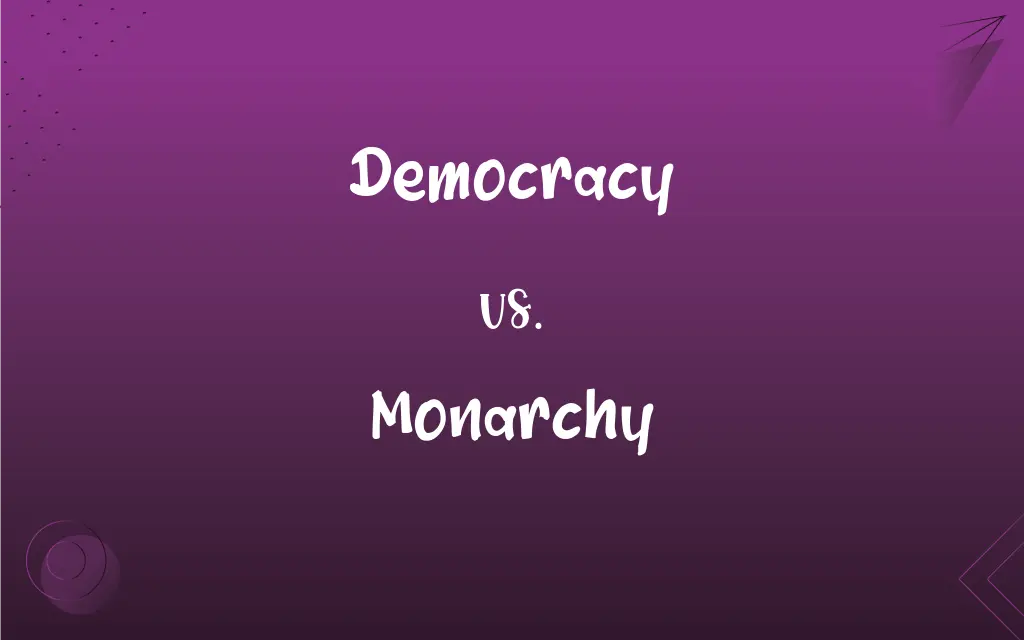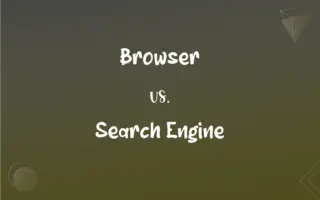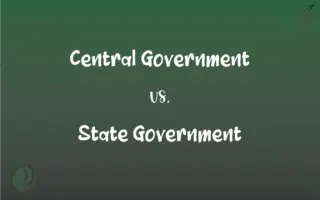Democracy vs. Monarchy: What's the Difference?
Edited by Janet White || By Harlon Moss || Updated on October 12, 2023
Democracy is governance by the people, often through elected representatives, while monarchy is ruled by a single, hereditary sovereign.

Key Differences
Democracy fundamentally hinges on the principle that the citizens have the authority to govern, which is typically executed through voting on policies and electing officials. Contrarily, monarchy is characterized by a single individual rule, where the ruling position is inherited, and the monarch holds the authority to govern the state or country. Thus, democracy is intrinsically linked to collective decision-making, while monarchy relies on the decisions of one individual or a selected group. Democracy places power in the hands of the population, fostering collective governance and potentially varied perspectives in decision-making, while monarchy concentrates power in an individual or dynasty, sometimes leading to unilateral decision-making without public consultation.
In a democracy, leaders are typically chosen through elections, which allows citizens to select among various candidates and political ideologies. In contrast, monarchy traditionally supports the hereditary transmission of leadership, typically from parent to child, without public involvement in the selection of their leader. The leadership transition in democracy is based on electoral outcomes, which are decided by the public, while monarchy adheres to hereditary or appointed transitions which are predetermined and not influenced by the common people. Democracy offers a platform where leaders are accountable to the public and their tenure is subject to electoral performance, whereas monarchy might sustain a lifelong or long-term rule without periodic checks through public voting.
Legislation in a democracy is generally created and approved through a process that involves representation from various segments of society, and ideally reflects the collective will. In stark contrast, legislation in a monarchy might be heavily influenced or directly determined by the monarch, with varying degrees of influence from other branches of government. Democratic systems employ legislative bodies, often composed of elected officials, who discuss, modify, approve, or reject laws, while monarchy may have a sovereign who possesses the power to enforce, reject, or enact laws, perhaps with an advisory or legislative body whose power is determined by the monarch.
Democracy often embeds mechanisms to safeguard against the misuse of power and typically enforces a separation of powers among the executive, legislative, and judicial branches. Monarchy, depending on whether it's absolute or constitutional, might concentrate extensive powers in the hands of the monarch or restrict it, allocating certain powers to constitutionally established institutions. Thus, democracy inherently builds frameworks that distribute power among various branches or levels of government to ensure a system of checks and balances, while monarchy may present varied structures from absolute control to symbolic roles with power delegated to parliamentary entities.
The notions of rights and freedom can manifest distinctly in democracies and monarchies. Democracy usually emphasizes individual rights, freedoms, and equal protection under the law, ensuring every citizen has a voice. Monarchy may or may not grant these same protections, with the rights of the citizens often subject to the disposition of the monarch. Thus, democracy inherently leans towards offering a platform for civil liberties and a voice to the citizenry in governance, while monarchy may establish citizen rights and freedoms that are conditional to the policies and viewpoints of the monarch or ruling body.
ADVERTISEMENT
Comparison Chart
Leadership Selection
Leaders are elected by citizens.
Leadership is usually hereditary.
Law-making
Laws are made by elected representatives.
Laws may be influenced or made by the monarch.
Power Distribution
Power is distributed among various branches.
Power may be concentrated in the monarch.
Citizen Participation
Citizens participate in governance via voting.
Citizen participation may be limited or non-existent.
Accountability
Leaders are accountable to the citizens.
Monarchs might not be directly accountable to citizens.
ADVERTISEMENT
Democracy and Monarchy Definitions
Democracy
Democracy supports the separation of powers among different branches of government.
Democracy ensures that legislative, executive, and judicial powers are distinct to prevent the abuse of power.
Monarchy
Monarchy traditionally allows the transfer of power through hereditary succession.
The monarchy of Japan has seen emperors from the same familial lineage for centuries.
Democracy
Democracy implies a system where citizens exercise power by voting.
In a democracy, citizens actively engage in elections to choose their leaders.
Monarchy
A monarchy is a form of government led by a single, hereditary ruler, often a king or queen.
In the monarchy of England, the throne is passed down through the royal family.
Democracy
Democracy enforces leaders to be accountable to the citizenry.
Leaders in a democracy are subject to public scrutiny and must account for their actions and policies.
Monarchy
Monarchy often involves leadership that is either absolute or bound by a constitution.
In Saudi Arabia, the monarchy exercises significant control over government affairs.
Democracy
Democracy frequently safeguards the rights and freedoms of the citizens.
Democracy upholds the principle that every individual has equal rights and freedoms under the law.
Monarchy
Monarchy can sometimes involve symbolic leadership, where the monarch’s role is ceremonial.
The monarchy in Sweden plays a largely ceremonial and representative role.
Democracy
Democracy encourages the equal participation of citizens in decision-making processes.
In a democracy, every vote is valued equally, ensuring all citizens have a say in governance.
Monarchy
Monarchy may have varied levels of control over government functions and legislative processes.
The British monarchy maintains a constitutional framework, limiting direct involvement in legislative affairs.
Democracy
Government by the people, exercised either directly or through elected representatives.
Monarchy
Government by a monarch.
Democracy
A political or social unit that has such a government.
Monarchy
A state ruled or headed by a monarch.
FAQs
Is the monarch’s power absolute in all monarchies?
No, monarchies can be absolute or constitutional, with varying monarch power degrees.
How is power transferred in a monarchy?
Power in a monarchy is commonly transferred through hereditary succession, though exact practices may vary.
Can citizens influence laws in a monarchy?
Depending on the monarchy type, citizen influence on laws might be limited or facilitated through parliamentary systems.
How does a representative democracy function?
In a representative democracy, citizens elect officials to represent their interests and make governing decisions.
Can a monarch be removed in a monarchy?
Monarch removal is subject to the monarchy's specific rules and is typically not subject to public vote.
What is a democracy?
Democracy is a government form where citizens have power, typically through voting and elected representatives.
How are leaders chosen in a democracy?
Leaders in a democracy are typically chosen through elections, where citizens vote.
Can monarchies have democratic elements?
Yes, constitutional monarchies may have democratic elements like parliamentary systems.
How are laws made in a democracy?
Laws in a democracy are often made by elected representatives through a structured legislative process.
What is a parliamentary democracy?
A parliamentary democracy allows citizens to elect representatives to a parliament, which then forms a government.
Can a monarchy transition into a democracy?
Yes, monarchies can evolve or be reformed into democracies through various means.
Can leaders be removed in a democracy?
Yes, leaders in democracies can often be removed through electoral processes or other mechanisms like impeachment.
What is a monarchy?
Monarchy is a government form led by a single ruler, often hereditary, who may possess various governance control levels.
Are all citizens allowed to vote in a democracy?
Generally yes, but specifics like voting age or other eligibility criteria may vary between democracies.
Can a democracy have a monarch?
A democratic government might have a ceremonial monarch, but actual governance is democratic.
Are individual freedoms protected in a democracy?
Democracies generally protect individual freedoms, but exact protections can vary.
Are individual freedoms protected in a monarchy?
Individual freedoms in a monarchy depend on its structure and the monarch’s policies.
Can a democracy transition into a monarchy?
Yes, governments can change forms, though such transitions involve significant shifts in governance structures.
What is a constitutional monarchy?
A constitutional monarchy limits the monarch's powers, often distributing them to constitutionally established entities.
Who makes governing decisions in a monarchy?
In a monarchy, the monarch makes governing decisions, possibly alongside other governing bodies.
About Author
Written by
Harlon MossHarlon is a seasoned quality moderator and accomplished content writer for Difference Wiki. An alumnus of the prestigious University of California, he earned his degree in Computer Science. Leveraging his academic background, Harlon brings a meticulous and informed perspective to his work, ensuring content accuracy and excellence.
Edited by
Janet WhiteJanet White has been an esteemed writer and blogger for Difference Wiki. Holding a Master's degree in Science and Medical Journalism from the prestigious Boston University, she has consistently demonstrated her expertise and passion for her field. When she's not immersed in her work, Janet relishes her time exercising, delving into a good book, and cherishing moments with friends and family.































































